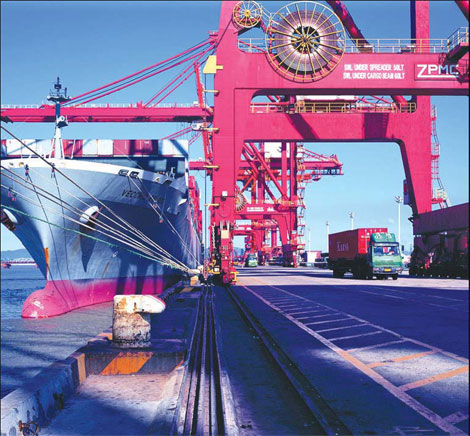Thriving port helps make Ningbo leader in trade
|
A freight ship docks at the Port of Beilun in the city of Ningbo. Ningbo has adopted an eco-friendly approach to developing port-related industry, which is helping to make the city a world-class port metropolis. Provided to China Daily |
Ningbo in East China's Zhejiang province has become a modern world-class port city after years of development.
What was once a low-profile seaside city has grown into an international port metropolis thanks to the country's reform and opening-up policy in the past three decades.
Its port has been the lifeline of Ningbo and also the biggest advantage of the city.
The city is bestowed with a rare deepwater port that is more than 18 meters deep and does not freeze in the winter.
Vessels with a capacity of 250,000 tons or less are able to travel freely in the port. And ships with capacities of 250,000 tons to 300,000 tons can enter the port with the tide.
The good natural conditions make Ningbo an ideal place to develop port-related industry. Located in the Yangtze River Delta, one of the country's economic engines, the city's geographic advantage has ensured the prosperity of the Port of Ningbo.
A large batch of major projects has been launched in Ningbo the past decades. The city now boasts a complete port-based industrial system that incorporates petrochemicals, electricity, steel production and papermaking.
With the establishment of a State-level economic zone and a bonded zone in Ningbo, the port is now on the fast track to development.
At present, the port has established trade connections with more than 600 ports from more than 100 countries and regions in the world.
All of the world's top 20 liners have opened regular cargo or passenger lines to Ningbo.
As of August this year, Ningbo had formed a global network with more than 200 cargo container routes.
The port is now an important entry point for the resources of national strategic importance, such as coal, oil and iron ore.
Ningbo is the largest crude oil processing base in the country, and more than 30 large domestic steel plants import iron ore through Ningbo port.
Zhejiang province has the largest number of thermal power stations in South China thanks to its bulk import of coal through Ningbo port.
Three decades of rapid development has seen the city's area expand from 18.3 square kilometers in 1978 to 285 sq km last year.
On the economic front, it took the city only 10 years for its GDP to grow from a mere 2 billion yuan ($320 million) in 1978, when the country launched its reform and opening-up policy, to more than 10 billion.
And in 1999, its GDP surpassed 104 billion yuan, which grew to 213 billion in 2004. The figure soared to 300 billion in 2007.
The city's GDP reached 601 billion yuan in 2011, ranking among the top in China. A thriving private economy is at the center of Ningbo's success, with private GDP accounting for 80 percent of the total now.
Meanwhile, the annual disposable income of urban residents soared from roughly 300 yuan in 1978 to more than 34,000 yuan last year.
The trade volume that passes through Ningbo port now leads the country. The total export and imports at the port exceeded $200 billion last year.
In the first half of this year, Ningbo port handled 222 million metric tons of cargo, a year-on-year increase of 6.1 percent and a historical high.
zhuanti@chinadaily.com.cn



















